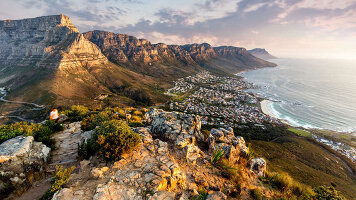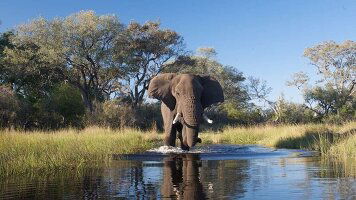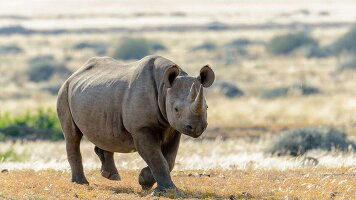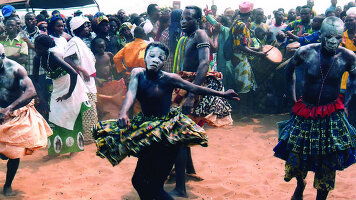Overview
Itinerary
Our tour starts today in Johannesburg, South Africa's largest city, once home to both Nelson Mandela and Desmond Tutu. A city of stark contrasts and infamous history, Johannesburg is going through rapid change and urban regeneration right before our eyes.
For those arriving in time today, our tour leader plans to meet you in the hotel reception at 12pm for a welcome meeting. Should you miss the welcome meeting, they'll inform you of any essential information as soon as you catch up.
Our hotel for tonight has a swimming pool and lovely gardens that you can feel free to relax in after your flight. Later in the afternoon, we can also provide transport to the nearby Nelson Mandela Square, an open-air piazza in Sandton which has lots of shops and dining options.
If you'd like an airport transfer today, you'll need to arrive into O.R. Tambo International Airport (JNB).
Please note, the majority of flights land in Johannesburg in the early morning and we can't facilitate an early check-in at our hotel. Luggage storage is available if you'd like to drop your bags before exploring. Stay: Sunrock Guesthouse (or similar) (Comfortable)
Leaving our hotel after breakfast, we'll head out of Johannesburg through the Lowveld which stretches before us into the distant horizons. 'Lowveld' translates from Afrikaans into English as 'the low bush' and the area has been inhabited since Stone Age times thanks to its plentiful water supply from mountain rivers and waterfalls.
Our destination is Graskop, a small town in the province of Mpumalanga, a peaceful location surrounded by forestry plantations and dramatic rock outcrops.
Please note, due to accommodation availability, we might switch the running of Day 2 and Day 6. If this happens, you'll still experience every aspect of the itinerary and the travel time will remain the same, just with an adjusted running order. Stay: Misty Mountain (or similar) (Comfortable) (B)
This morning, we'll make a few scenic stops along the way, including the well-known God's Window, where you can enjoy sweeping views of the landscape below. We'll also visit the Blyde River Canyon, known for its impressive cliffs and lush surroundings.
Another stop includes Bourke's Luck Potholes, a series of unusual rock formations created by centuries of water erosion at the meeting point of the Treur and Blyde rivers. We aim to arrive at our lodge in the mid-afternoon, with time to settle in and relax. Stay: Timbavati Safari Lodge (or similar) (Comfortable) (B/L/D)
Today offers a fantastic opportunity to spot wildlife from the comfort of our vehicles, with the option to join a guided walk in the reserve (no big cats present) led by experiecned rangers. Our guides are experts in the bush and always happy to share insights about the area's wildlife, so feel free to ask questions along the way.
Kruger National Park is home to an incredible variety of animals, from large game to smaller species , along with a rich diversity of birdlife. We'll take our time to enjoy the sigtnings before returning to the lodge where you can relax by the pool and unwind after a rewarding day. Stay: Timbavati Safari Lodge (or similar) (Comfortable) (B/L/D)
We begin the day with a relaxed bush walk on the lodge grounds, followed by a hearty breakfast. After checking out, we make our way to the southern gate of Kruger National Park-a scenic drive of about two hours. Along the way, we'll stop at one of the park's rest camps for lunch and maybe a refreshing swim as well.
In the afternoon, we continue deeper into the park, keeping an eye out for The Big Five-lion, leopard, buffalo, elephant, and rhinoceros-some of the most iconic wildlife species in Africa. As the sun sets, we head to our next lodge to settle in and reflect on another memorable day in the bush.
Our comfortable accommodation sits just outside the Kruger National Park gates near Hazyview. Each of the 30+ rooms began life as a shipping container but has since been transformed into a quirky self-contained unit, complete with air conditioning, a spacious shower and bathroom, and a well-appointed outdoor sitting area Stay: SleepOver Phabeni Gate (or similar) (Comfortable) (B)
We'll have an early start this morning, but it'll be worth it for the chance of spotting Kruger's wildlife. Leaving our accommodation shortly after sunrise, we'll head out for our morning game drive.
We'll stop at various watering holes where we might see buffalo or antelope taking an early morning drink and hopefully a pride of lions nearby. Our morning drive will be capped with a lunch break before we head out on an afternoon drive. Stay: SleepOver Phabeni Gate (or similar) (Comfortable) (B)
We'll have another game drive this morning before we head south to Eswatini, passing through the rural townships and mountain scenery of the Blyde River Canyon escarpment.
The small kingdom of Eswatini is a tiny and independent land, inhabited by the Swazi people who revere their king and retain an age-old culture and traditions. Our journey takes us through some spectacular scenery in the Ezulwini Valley, past traditional homesteads, curio stalls and the old mining settlement of Piggs Peak before we eventually enter one of Eswatini's best wildlife reserves, Mlilwane Wildlife Sanctuary, later this afternoon.
For the next two nights, we'll stay at a camp within the sanctuary. Located beneath the Nyonyane Mountains, it's a haven of tranquillity. Our accommodation will be divided between dome-shaped bee huts, rondavels and traditional huts and we'll have all of the mod cons, including showers, toilets, an outdoor swimming pool and a restaurant/bar - it's rustic in the very best sense of the word. We'll share the camp with warthogs and ostrich, too, in fact, the restaurant overlooks a lake where you can spot the resident hippo and waterbirds.
Please note, due to the high demand in Mlilwane, our accommodation is subject to change without notice and might differ from the description above. We'll always endeavour to stay within the park, however, some departures might stay at a hotel up to a 15-minute drive away from the sanctuary. Stay: Mlilwane Game Sanctuary (or similar) (Comfortable) (B)
We'll head out on a walk this morning, in search of zebra, wildebeest, impala, nyala and warthog. Mlilwane has a large area of open grasslands, so game viewing is relatively easy.
This afternoon, you're free to relax or take part in one of our optional activities. The great advantage of Mlilwane is that there are no big cats, so you can get a different game-viewing experience, heading out on foot. You might like to try one of the self-guided mountain walking trails, following the historic aqueduct around the Nyonyane Mountains; or one of the riverside trails in search of birdlife and hippo. (B)
Crossing through Eswatini, we'll head for the southern border point at Golela, passing back into South Africa and continuing through KwaZulu Natal to the northern settlement of Kosi Bay, close to the Mozambique border.
For the next two nights, we'll stay close to the shores of the Indian Ocean. Our accommodation is a lodge set amidst a wetland area of lakes and forest, home to a rich diversity of birds and animals including hippos and crocs.
On arrival, we'll have some free time to explore and enjoy the protected area, which was declared a nature reserve back in 1950. It's considered one of the most pristine lake systems along the South African coast. Stay: Utshewayelo Lodge (or similar) (Comfortable) (B/D)
Today we'll make the most of the coastal setting, with a walk along the beaches and forests of this area. We'll be hoping to spot small antelope and the astounding variety of birds that live here. If you'd like to get out in the water, you can snorkel at Kosi Bay Mouth, the estuary and over the coral reef (weather dependent) with equipment available from the lodge. Stay: Utshewayelo Lodge (or similar) (Comfortable) (B/L/D)
Travelling down the coast this morning, we'll head towards the greater St. Lucia Wetland Park, situated on the coast of the Indian Ocean. This wonderful wetland reserve was recently granted World Heritage status as the largest estuarine lake system in Africa.
Whilst in St Lucia, you can choose to take part in one of several optional activities. There is the option of a night drive to spot giant turtles coming ashore and between June and November, there'll be the option of whale watching, too. Stay: Forest Lodge (or similar) (Comfortable) (B)
We'll get the chance to relax today with another day on the coast. Again, there'll be optional activities on offer, including whale watching (June to November) and turtle watching (November to March). There's also the option to join a boat trip on the St. Lucia River to spot hippos and crocodiles. Stay: Forest Lodge (or similar) (Comfortable) (B)
Departing St Lucia this morning, we'll drive south along the coast to Durban's International Airport (DUR), aiming to arrive at around 2pm, where our trip ends. The earliest your flight can depart is 3pm.
If you are taking an evening flight from Durban, it's possible to make a stop at Umhlanga Beach en route to the airport. The beach is just ten minutes from Durban city centre and boasts expansive golden sands stretching northwards of 200 kilometres/124 miles. There are plenty of restaurants and bars, as well as a shopping centre to pick up last-minute souvenirs. (B)
Trip Inclusions
- Witness the unrivalled natural beauty of Kosi Bay - a turquoise snorkeller's paradise
- Visit a traditional Zulu village and learn about the rich culture of these incredible people
- Go on a thrilling walking Safari in Eswatini's renowned Mlilwane National Park
- Moderate pace tours are ideal if you want a holiday which combines exciting activities and experiences with plenty of time to relax and unwind. Typically you'll be active and busy for part of the day but then also have time to rest and recharge your batteries.
- Accommodation, itinerary and inclusions subject to change.
- Price is for land, cruise and internal flights as specified. Flights not specified are not included
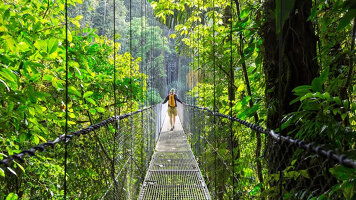
Launching in 1981, Explore offer classic small group and private adventures to over 130 countries. Read more
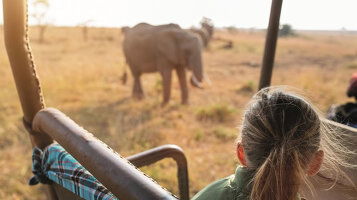
You won't find any 40-seater tourist coaches on an Explore family adventure holiday. To ensure you get the most out of your trip Explore keep group sizes small. Read more
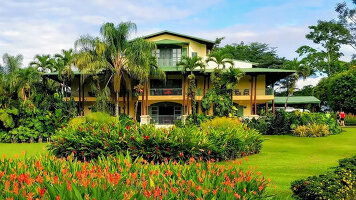
The places Explore stay are every bit as important as the sights they visit and the things you do. Read more
Download Brochure
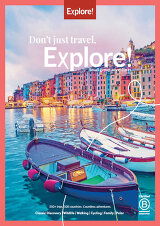
Explore Worldwide Small Group Adventures (2025-26)
Dates & Pricing
 USD
USD
A definite departure means minimum numbers have been reached for this departure to operate. Your Global Journeys Travel Advisor will check the availability of your departure date when you Inquire. Additional savings may apply. T&C’s apply.
Tour & cruises prices are per person. Prices shown have savings applied, are subject to availability and may be withdrawn at any time without notice. Pricing and trip details are correct at this point in time, however are subject to confirmation at the time of booking and are subject to change by Explore. For cruise itineraries, cabin images are sourced from the cruise-line and should be treated as indicative only. Cabin inclusions, upholsteries and room layout may differ to the image(s) shown depending on the ship selected and your sailing dates.





